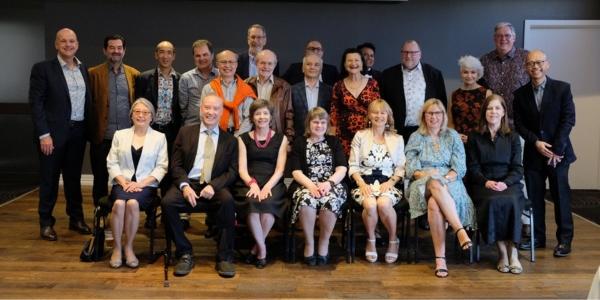2:30min

Last month, long standing Optometry Victoria member, David Leong shared the photo above of 22 alumni from the 1983 University of Melbourne Optometry class, celebrating the 40th anniversary of their final undergraduate year. Remarkably, only two of the alumni were unable to attend. The fantastic turn out reflects the strong bonds these optometrists have carried through to this day.
We caught up with David recently to ask about his past 40 years as an optometrist and his hopes for the future of the profession.
Q: The reunion sounds like it was a great success. Why do you think gatherings like this are important for practising optometrists?
David: It is great to have reunions to connect on both a professional and personal level, particularly for those of us in solo practice, like myself, where interaction with other optometrists is less frequent. I also cycle with a group of optometrists and find this another helpful way to network. It’s useful to see how my colleagues approach similar issues both clinically and professionally, which helps me make better decisions in my practice.
Q: What lead you to a career in optometry?
David: I liked the uniqueness of our profession, as it combines a clinical and paramedical focus with a retail component. Also, as a young myope I needed spectacles, and was impressed with the scope of my local optometrist’s work. I wanted to work in a profession where I was dealing with people, solving vision and eye problems.
Q: Tell us a little about your optometry practice.
David: My practice is located in Vermont South, an outer eastern Melbourne suburb. I’m a true solo practitioner and started this practice from scratch 33 years ago with my wife, who was then its part-time receptionist. I’ve since grown the practice into a busy one and have never advertised, but rather relied exclusively on word of mouth. I now have four part-time staff, including another optometrist.
Q: What are the three most significant changes within optometry that you have seen over the past 40 years?
David: Firstly, access to therapeutics. To be able to prescribe topical medications allows optometrists to practise to the full extent of our training and better meet the needs of our patients.
Secondly, technology. The diagnostic tools we have at our disposal are incredible. Instruments such as OCTs, corneal topographers, and more have revolutionised what we can detect and manage clinically. I am still amazed that when I started my own practice, I did not have a single computer. Now my practice runs several!
Finally, myopia control. Being able to slow down what was previously untreatable is fundamentally changing the way we deal with childhood myopia. In certain demographics, myopia is an epidemic and leads to potentially vision threatening conditions. Mitigating these problems is a game changer.
Q: What changes are you excited about in optometry in the coming decade?
David: I’m excited about expanding our scope of practice, so that we can do more as eye care providers. Being able to prescribe oral therapeutics is the next step in this journey. Perhaps beyond the end of my career, we would see optometrists performing YAG capsulotomies and minor eyelid lesion removals. Who knows, one day we may see optometrists performing intravitreal injections!
Q: You’ve been a member of OV/SA for over 40 years now, why do you continue to be a member?
David: I have been a long term member of the OV/SA, now OA, as it supports the profession and myself in so many ways. It provides excellent CPD and substantial professional and business support. It’s a strong advocate for our profession too, such as dealing with the government in the complex Medicare area.
Q: You mentioned you are a cyclist, tell us a bit about that. How often and how far do you tend to cycle?
David: I’m a typical MAMIL (Middle Aged Male In Lycra). I cycle for fitness and social interaction. Sharing a latte with my fellow road warriors at the end of the ride is always the highlight.
I cycle between 150km and 250km per week, with an average distance of 50km with the occasional 100km ride. My riding locations vary – I have ridden up nearly every substantial alpine mountain in Victoria (including Baw Baw, Lake Mountain, Buffalo, Hotham, Falls Creek and Donna Buang). I’m equally happy cruising along the many great bike paths we have in and around Melbourne.
Q: Does physical exercise help you stay focused professionally?
David: As well as cycling, I walk about 8km most mornings with my wife before I head to work. Cycling and walking help my health and mental state, because concentrating on a physical activity relaxes me and clears my mind of any residual clutter from the previous day. Elevating my heart rate also energises me for a busy day in the practice. It gets my day off to a fresh and vigorous start.
This story was created and shared by Optometry Victoria South Australia (OV/SA).
Tagged as: graduates, member profile, members, social